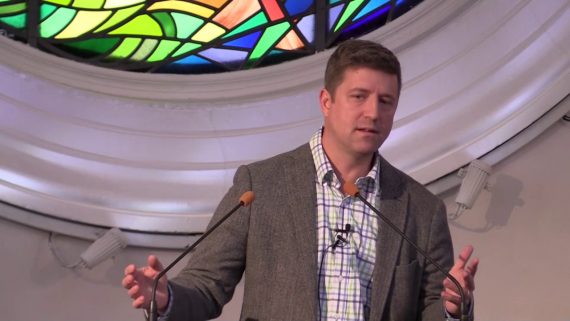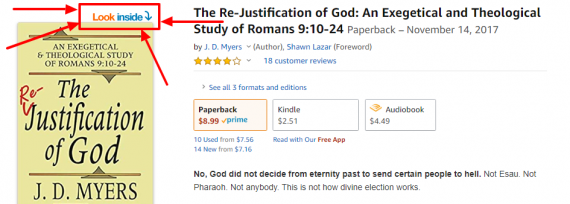What is evangelism? What needs to be said in evangelism? Who do you say it to? How long does evangelism take? What Scriptures should you use? How do you know when someone has been “evangelized”? Ask these questions to 10 people, and you will get 11 answers (because there’s always that one guy who gives two answers).
There is a lot of confusion today about how to evangelize and what to say and do in evangelism. I believe the primary problem lies in the word itself. The word proves the truth of the saying, “The translation is the traitor!” Let me show you what I mean.
Evangelism from the Greek
You would never know it in English, but in Greek, the words “gospel” (Gk. euangelion) and “evangelism” (Gk. euangelizomai) have the same root. In fact, the word “evangelism” isn’t really a translation of the Greek word at all, but is instead a transliteration. The translators, rather than translate euangelizomai, just changed the Greek letters into English, and left it:
euangelizomai
evangelism
 Sometimes, the English translations use the phrase “preach the gospel” which is better than “evangelism” but tends to make us think that the gospel is spread only by preaching, which as we saw in a previous post, is simply not true.
Sometimes, the English translations use the phrase “preach the gospel” which is better than “evangelism” but tends to make us think that the gospel is spread only by preaching, which as we saw in a previous post, is simply not true.
Let me suggest a new term instead of evangelism.
How about “gospelism” (evangelizing = gospelizing)? This would help show a clearer connection between the gospel itself and the activity of spreading the gospel. This would really help clarify what gospelism is (i.e., what evangelism is) and how to carry it out.
What is Gospelism?
If (as we saw in a previous post) the gospel is more than a set of propositions which must be believed to receive eternal life, then gospelism is way more than just sharing a set of propositions to a person in the hopes that they will believe and receive eternal life.
Put another way, gospelism takes place whenever the gospel is revealed.
And if the gospel contains all sorts of truths about the temporal and eternal benefits that are offered through the life, death, and resurrection of Jesus, then logically, any time we share (either by word or deed) any of the truths related to the gospel, we are gospelizing.
Since the gospel contains truths about how to live life in light of the incarnation and resurrection of Jesus, “gospelizing” is not only done with words, but with actions as well. Ideally, since the gospel is related to all aspects of life, our entire life – all we say and do – will be gospelizing.

More concretely, since the gospel affects how we interact with others, how we spend our money, how we use our time, etc., we are gospelizing not only when we preach and teach about the gospel, but also when we treat others with kindness, fairness and honesty, when we show forgiveness and grace, when we stand up for the poor, the neglected, and the outcast, and any time we reveal the changes that the gospel has brought about in our own life.
When evangelism becomes gospelism, and we see that the gospel is for all of life, then gospelism is for all of life as well.
Gospelism is not just about eternal life, but about all of life … just like the gospel.
Read these posts to learn more about gospelism:
Evangelism is Gospelism (Part 1)
Evangelism is Gospelism (Part 2)
Evangelism is Gospelism (Part 3)
Evangelism is Gospelism (Part 4)
Evangelism is Gospelism (Part 5)
Evangelism is Gospelism (Part 6)
 Want to learn more about the gospel? Take my new course, "The Gospel According to Scripture."
Want to learn more about the gospel? Take my new course, "The Gospel According to Scripture."
The entire course is free for those who join my online Discipleship group here on RedeemingGod.com. I can't wait to see you inside the course!




 But there are numerous considerations from the text which reveal that this is not what Jesus is saying, and this is not how we should understand the passage.
But there are numerous considerations from the text which reveal that this is not what Jesus is saying, and this is not how we should understand the passage.

 Jesus sought to reverse this entire line of thought, as the following contexts make quite clear (Matthew 19:23-30; Mark 10:23-30; Luke 18:24-30). It is difficult for the rich to enter the Kingdom of heaven because they rely on their riches as evidence that they are already living the life God wants for them.
Jesus sought to reverse this entire line of thought, as the following contexts make quite clear (Matthew 19:23-30; Mark 10:23-30; Luke 18:24-30). It is difficult for the rich to enter the Kingdom of heaven because they rely on their riches as evidence that they are already living the life God wants for them.







 One famous example is when Julius Caesar adopted Octavian (who became Caesar Augustus) to be his heir, even though Octavian was not Caesar’s son. Caesar had a biological son with Cleopatra named Caesarion, but he was not named as heir.
One famous example is when Julius Caesar adopted Octavian (who became Caesar Augustus) to be his heir, even though Octavian was not Caesar’s son. Caesar had a biological son with Cleopatra named Caesarion, but he was not named as heir.

 Instead, Paul’s letter to the Romans is about how the gospel “saves” believers and unbelievers alike (Romans 1:16-17) from wrath. This becomes clearer still when we recall that the word “saves” does not mean “justifies” but “delivers” (see
Instead, Paul’s letter to the Romans is about how the gospel “saves” believers and unbelievers alike (Romans 1:16-17) from wrath. This becomes clearer still when we recall that the word “saves” does not mean “justifies” but “delivers” (see  The first example is Jacob and Esau, and it is important to note that both Jacob and Esau were elected, or chosen, by God. It is often assumed that only Jacob was chosen by God, but Paul clearly indicates that God chose the older brother, Esau, to serve the younger brother, Jacob.
The first example is Jacob and Esau, and it is important to note that both Jacob and Esau were elected, or chosen, by God. It is often assumed that only Jacob was chosen by God, but Paul clearly indicates that God chose the older brother, Esau, to serve the younger brother, Jacob. Instead, God raised up Pharaoh and solidified the proud and stubborn rebellion that was in Pharaoh’s heart so that those who witnessed and heard of what happened in Egypt would know that the God of Israel alone was God. Could not God, in His gracious sovereignty, do such a thing with Pharaoh without affecting whatsoever Pharaoh’s ability to believe in God’s promises and thus become part of God’s redeemed people?
Instead, God raised up Pharaoh and solidified the proud and stubborn rebellion that was in Pharaoh’s heart so that those who witnessed and heard of what happened in Egypt would know that the God of Israel alone was God. Could not God, in His gracious sovereignty, do such a thing with Pharaoh without affecting whatsoever Pharaoh’s ability to believe in God’s promises and thus become part of God’s redeemed people? Read this way, God does not create two classes of people, one to destroy and one to bless. God does not create vessels for dishonor, but instead, endures with patience those who are dishonorable in the hopes that they would see His mercy and become vessels of honor.
Read this way, God does not create two classes of people, one to destroy and one to bless. God does not create vessels for dishonor, but instead, endures with patience those who are dishonorable in the hopes that they would see His mercy and become vessels of honor. Having made this point, Paul goes on to argue in Romans 10 that Israel did not fail, but actually succeeded, and in fact, can continue to be elect by joining the elect people of God in the church. This is why Paul calls the church to proclaim the gospel to the Jews as well.
Having made this point, Paul goes on to argue in Romans 10 that Israel did not fail, but actually succeeded, and in fact, can continue to be elect by joining the elect people of God in the church. This is why Paul calls the church to proclaim the gospel to the Jews as well. In this way, when Paul writes about branches being cut off so others can be grated in which will lead to the cut off branches being grafted back in again, he is not talking about people losing and regaining eternal life, but about losing and re-gaining places of privilege and purpose in God’s plan for this world. God’s plan of redemption started with Israel, shifted to the church (consisting of both Jewish and Gentile believers), so that “of Him and through Him and to Him are all things” (Romans 11:36).
In this way, when Paul writes about branches being cut off so others can be grated in which will lead to the cut off branches being grafted back in again, he is not talking about people losing and regaining eternal life, but about losing and re-gaining places of privilege and purpose in God’s plan for this world. God’s plan of redemption started with Israel, shifted to the church (consisting of both Jewish and Gentile believers), so that “of Him and through Him and to Him are all things” (Romans 11:36).